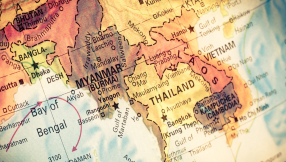For years, it was widely believed that early human beings made their first travel from the African continent to nearby Europe 60,000 years ago.
Recently unearthed ancient teeth, however, suggest that Homo sapiens were not Europe-bound during their first journey out of Africa. They were, in fact, headed towards East Asia, particularly China.
The recent discovery was made inside the Fuyan cave in Daoxian, south-east China by a team led by María Martinón-Torres from the University College London. This cave was also where animal bones typical of the Late Pleistocene, or the age some 120,000 years ago, were found.
The 47 ancient teeth, believed to have belonged to at least 13 different Homo sapiens, were found under a layer of stalagmites that formed after the teeth were deposited there.
Martinón-Torres believes the stalagmites can provide clues to the age of the teeth, which in turn can shake up the way we think of how early humans dispersed during the ancient times.
"The stalagmites are at least 80,000 years old, so that's the minimum age of the teeth," Martinón-Torres explained, as quoted by The News Scientist.
"It means we have to re-think different models of our dispersal. We have to rethink our species' dispersal. Early humans may have left Africa several times," she added.
The idea that early human beings went to China way before reaching Europe also makes sense if the differences in temperature between the two areas are considered.
Europe's ice-cold weather may have kept early humans from entering the continent, pushing them to the sunnier parts of Asia.
"Homo sapiens is a tropical species, so it was easier for them to move east than north," Martinón-Torres explained.
The next challenge for the team now is to determine if the early human beings who owned these teeth actually interacted with more primitive homonids.
"We don't know what happened to the population, whether they simply vanished, and China was repopulated later, or whether they interacted with other hominins," Martinón-Torres explained. Hominins form the group that consists of modern humans while hominid is the larger group consisting of all modern and extinct Great Apes, including chimpanzees, gorillas, orang-utans, their ancestors, and modern humans, according to Australian Museum. An important distinction, scientists say, is that all hominins are hominids, but very few hominids are hominins.
Martinón-Torres also sought for further studies on the genetic impact of the early human's journey to China.









